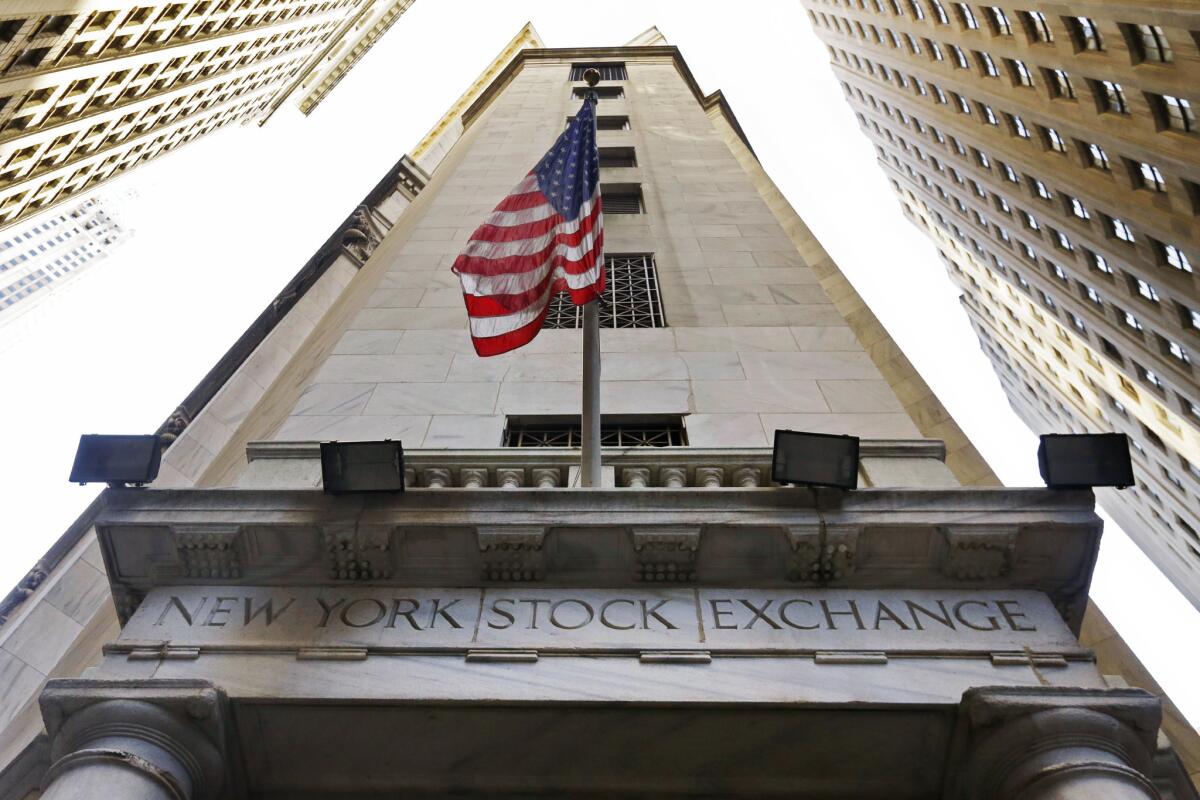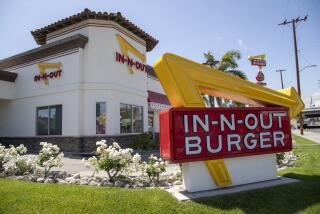Stocks fall; analyst says ‘rally has largely run its course’
- Share via

A late slump Friday pulled U.S. stocks to their third straight weekly loss. Companies that make clothing, food and household goods dropped on more bad news from department stores, and energy companies fell with the price of oil.
Machinery and equipment companies took some of the biggest losses. Bond prices jumped and yields fell, which hurt bank stocks.
“The rebound and recovery rally has largely run its course,” said Mike Ryan, chief investment strategist for UBS Wealth Management Americas. With investors worrying about weak corporate profits, the health of the global economy and the Federal Reserve’s plans, Ryan said, “it’s going to be more of a grind” in the coming months.
The Dow Jones industrial average slumped185.18 points, or 1.1%, to 17,535.32. The Standard & Poor’s 500 index fell 17.62 points, or 0.9%, to 2,046.49. The Nasdaq composite index slid 19.66 points, or 0.4%, to 4,717.68.
The S&P 500 has fallen 2.2% over the last three weeks, bringing the index back almost to break-even for the year.
Wrapping up a brutal week, Nordstrom gave retailers yet another gut punch when it slashed its annual projections and said a key measure of sales fell for the first time in almost seven years. Nordstrom stock tumbled 13.4%, to $39.16, a four-year low. J.C. Penney’s and Dillard’s also reported results that fell short of analysts’ estimates.
A Commerce Department report released Friday confirmed that consumers are spending more, just not at department stores.
Consumer stocks slumped after advancing Thursday. Wal-Mart gave up 2.8% to $64.94 and Costco sank 1.5% to $144.50. PepsiCo fell 1.8% to $104.18 after investment firm Trian disclosed that it had sold its stake in the company.
U.S. government bond prices jumped in the afternoon, and the yield on the 10-year U.S. Treasury note fell to 1.70%, from 1.76%. Declines in bond yields tend to hurt banks, because rates on many kinds of long-term loans such as mortgages are tied to bond yields.
Wells Fargo slid 2% to $48.24. Bank of America declined 1.8% to $13.88 and Citigroup fell 2% to $43.11.
Benchmark U.S. oil fell 49 cents, or 1%, to $46.21 a barrel in New York and Brent crude, the benchmark for international oil prices, slipped 2 cents to $47.83 a barrel in London. That pulled energy stocks down. Exxon Mobil fell 1.1% to $88.66 and Murphy Oil sank 4% to $29.14.
Graphics chip and processor maker Nvidia surpassed Wall Street forecasts in the first quarter, and its stock jumped 15.2% to $40.98.
Shake Shack’s profit and sales beat estimates, in part because people snapped up its new fried chicken sandwich. The burger chain raised its estimates for sales and said it will open more stores than previously planned. The stock climbed 9.7% to $37.60.
Metals prices were little changed. Gold rose $1.50 to $1,262.70 an ounce. Silver edged up 3 cents to $17.13 an ounce. Copper remained at $2.07 a pound.
In other energy trading, wholesale gasoline inched up to $1.59 a gallon. Heating oil rose 1 cent to $1.40 a gallon. Natural gas fell 6 cents, or 2.7%, to $2.10 per 1,000 cubic feet.
The euro fell to $1.1307, from $1.1373, and the dollar slid to 108.63 yen, from 109.14 yen.
Germany’s DAX rose 0.9% and the CAC-40 in France gained 0.3%. The FTSE 100 in Britain was up 0.6%. Japan’s benchmark Nikkei 255 index lost 1.4%, and South Korea’s Kospi shed 0.5%. Hong Kong’s Hang Seng fell 1%.
UPDATES:
2:18 p.m.: This article was updated with closing prices and additional information.
This article was originally published at 8:07 a.m.
More to Read
Inside the business of entertainment
The Wide Shot brings you news, analysis and insights on everything from streaming wars to production — and what it all means for the future.
You may occasionally receive promotional content from the Los Angeles Times.








